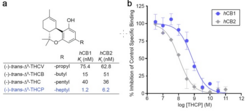Tetrahydrocannabiphorol: Difference between revisions
>AuDHD non existent template |
>Larnaca m An old edit was accidentally reverted. |
||
| (2 intermediate revisions by 2 users not shown) | |||
| Line 4: | Line 4: | ||
{{stub}} | {{stub}} | ||
'''Tetrahydrocannabiphorol''' ('''THCP''') is a potent phytocannabinoid that is structurally similar to delta-9-THC, the main psychoactive compound in cannabis. Like THC, THCP is a CB1 and CB2 receptor agonist | '''Tetrahydrocannabiphorol''' ('''THCP''') is a potent phytocannabinoid that is structurally similar to delta-9-THC, the main psychoactive compound in cannabis. Like THC, THCP is a CB1 and CB2 receptor agonist with psychoactive effects. Initial in-vitro binding assay studies suggest that THCP may be up to 30 times more potent than delta-9-THC,<ref name="Citti et al 2019">{{cite journal | vauthors = Citti C, Linciano P, Russo F, Luongo L, Iannotta M, Maione S, Laganà A, Capriotti AL, Forni F, Vandelli MA, Gigli G, Cannazza G | title = A novel phytocannabinoid isolated from Cannabis sativa L. with an in vivo cannabimimetic activity higher than Δ<sup>9</sup>-tetrahydrocannabinol: Δ<sup>9</sup>-Tetrahydrocannabiphorol | journal = Scientific Reports | volume = 9 | issue = 1 | pages = 20335 | date = December 2019 | pmid = 31889124 | pmc = 6937300 | doi = 10.1038/s41598-019-56785-1 | bibcode = 2019NatSR...920335C }}</ref><ref>https://www.livescience.com/new-potent-cannabinoid.html</ref> potentially leading to more pronounced psychoactive effects. However, the full extent of THCP's psychoactivity and how it compares to THC is still being researched. | ||
==History and culture== | ==History and culture== | ||
==Pharmacology== | ==Pharmacology== | ||
[[File:Tetrahydrocannabiphorol_Ki.png|thumbnail|250px|right|Binding affinities of THCP for CB1 and CB2 receptors, with D8/D9 THC comparisons.<ref name="Citti et al 2019"></ref>]] | |||
==Subjective effects== | ==Subjective effects== | ||
The subjective effects have not been fully understood. | The subjective effects have not been fully understood, but it is known that THCP boasts a longer alkyl side chain than THC,<ref>[https://floraflex.com/default/blog/post/unraveling-the-differences-between-thcp-and-thc Unraveling the Differences Between THCP and THC], FloraFlex</ref> which might contribute to it's ability to better connect with human cannabinoid receptors [[CB1]] and [[CB2]].<ref>[https://www.caymanchem.com/news/why-does-alkyl-chain-length-matter Why Does Alkyl Chain Length Matter], Cayman Chemicals</ref> | ||
===Experience reports=== | ===Experience reports=== | ||
Revision as of 01:08, 10 April 2025
| Summary sheet: Tetrahydrocannabiphorol |
 |
This article is a stub. As such, it may contain incomplete or wrong information. You can help by expanding it. |
Tetrahydrocannabiphorol (THCP) is a potent phytocannabinoid that is structurally similar to delta-9-THC, the main psychoactive compound in cannabis. Like THC, THCP is a CB1 and CB2 receptor agonist with psychoactive effects. Initial in-vitro binding assay studies suggest that THCP may be up to 30 times more potent than delta-9-THC,[1][2] potentially leading to more pronounced psychoactive effects. However, the full extent of THCP's psychoactivity and how it compares to THC is still being researched.
History and culture
Pharmacology

Subjective effects
The subjective effects have not been fully understood, but it is known that THCP boasts a longer alkyl side chain than THC,[3] which might contribute to it's ability to better connect with human cannabinoid receptors CB1 and CB2.[4]
Experience reports
There are currently no anecdotal reports which describe the effects of this compound within our experience index.
Toxicity and harm potential
Tolerance and addiction potential
Dangerous interactions
Legal status
 |
This legality section is a stub. As such, it may contain incomplete or wrong information. You can help by expanding it. |
- United States: THCP is not currently classified under any drug schedule in the United States, but it is federally legal.
External links
References
- ↑ 1.0 1.1 Citti C, Linciano P, Russo F, Luongo L, Iannotta M, Maione S, Laganà A, Capriotti AL, Forni F, Vandelli MA, Gigli G, Cannazza G (December 2019). "A novel phytocannabinoid isolated from Cannabis sativa L. with an in vivo cannabimimetic activity higher than Δ9-tetrahydrocannabinol: Δ9-Tetrahydrocannabiphorol". Scientific Reports. 9 (1): 20335. Bibcode:2019NatSR...920335C. doi:10.1038/s41598-019-56785-1. PMC 6937300
. PMID 31889124.
- ↑ https://www.livescience.com/new-potent-cannabinoid.html
- ↑ Unraveling the Differences Between THCP and THC, FloraFlex
- ↑ Why Does Alkyl Chain Length Matter, Cayman Chemicals